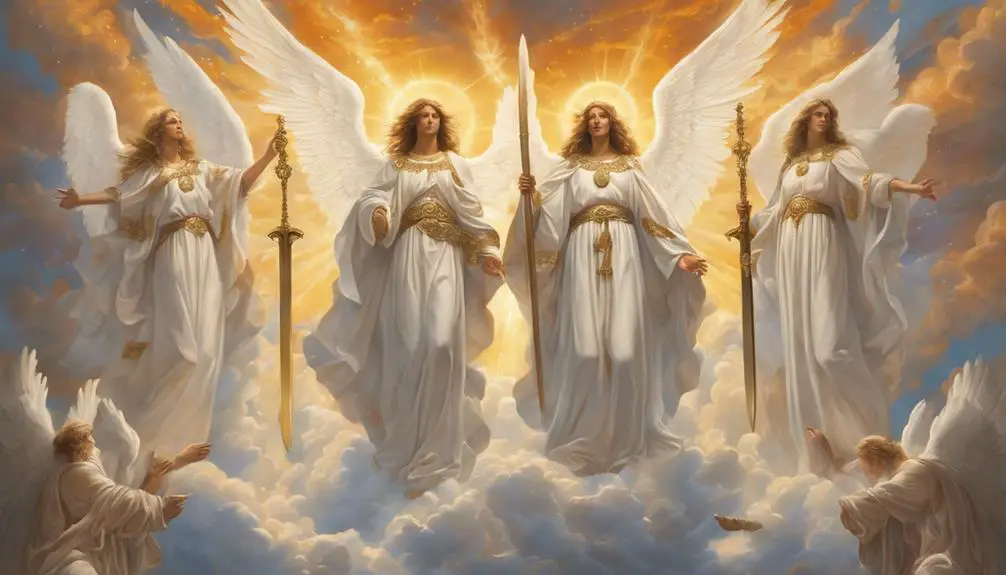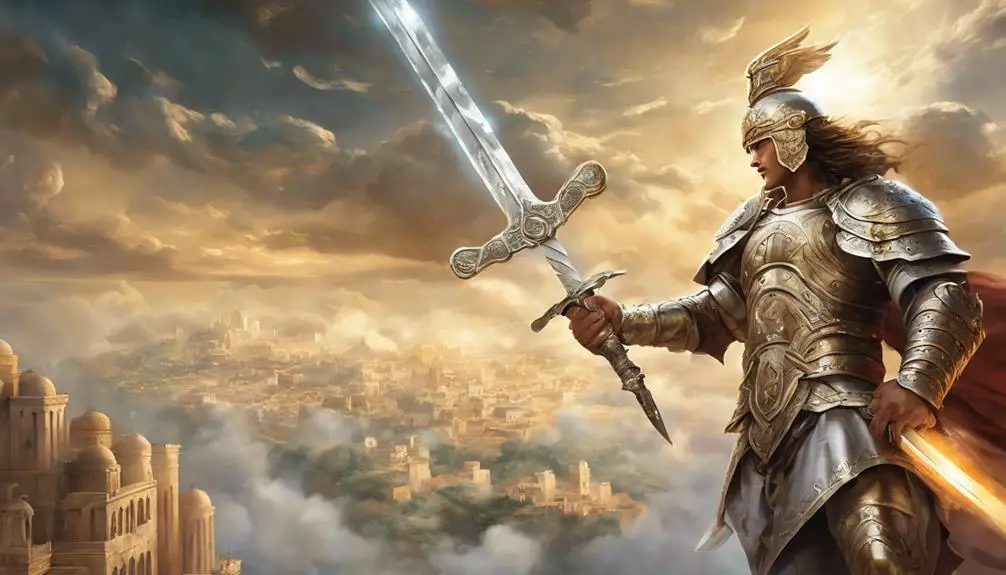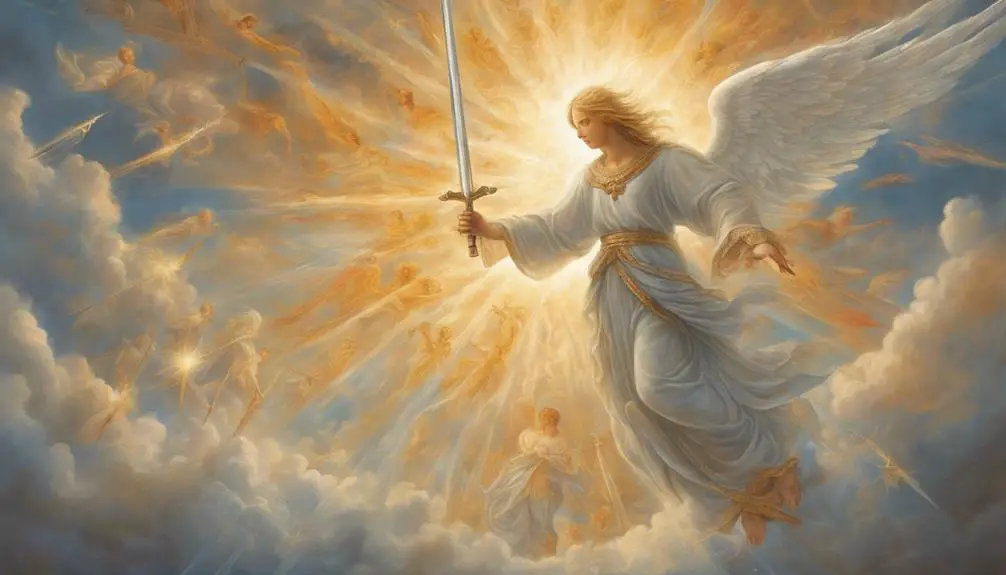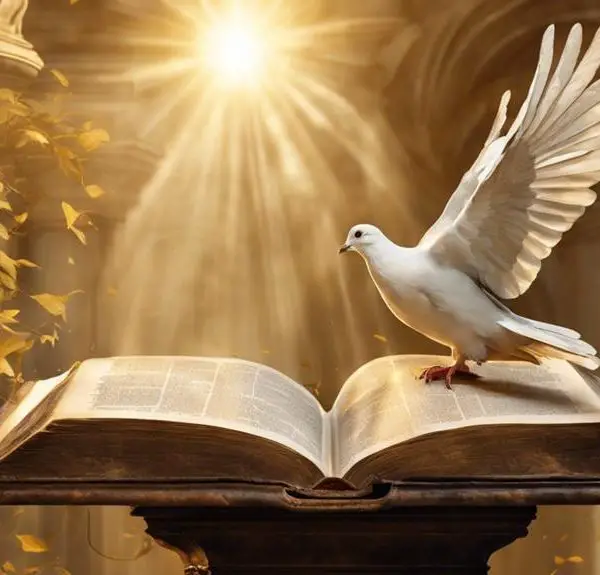Observe the profound symbolism of angels with swords in the bible, a journey into divine justice and protection awaiting your exploration.

Angels With Swords in the Bible
Recall the tale of the fiery cherubim guarding the gates of Eden with a flaming sword, a sight both awe-inspiring and terrifying. Have you ever wondered about the deep symbolism behind such biblical narratives featuring angels with swords?
It's a topic brimming with theological interpretations and historical implications. Yet, we often overlook these instances, perhaps due to their infrequent appearances or the complexity of their implications.
So, won't you join in this exploration of such powerful, enigmatic figures and their symbolic weaponry?
Key Takeaways
- Angels with swords in the Bible symbolize divine authority, judgement, and act as barriers against evil.
- The swords held by these angels represent divine truth, protection, and separation between earthly and divine.
- Biblical accounts depict significant angelic battles, demonstrating their role in supernatural warfare against evil.
- Cherubim, as guardian angels of Eden, embody the symbolism of angels with swords, representing divine protection and justice.
Biblical Accounts of Sword-Wielding Angels

Where in the Bible do we encounter angels brandishing swords? Two prominent instances come to mind. In Genesis 3:24, after Adam and Eve are banished from the Garden of Eden, an angel, or cherubim, is placed at the entrance, wielding a flaming sword. This angel's duty is to bar access, guarding the way to the Tree of Life.
In the Book of Numbers 22:23, another Angel Apparition occurs, where Balaam's donkey sees an angel of the Lord standing in the path with a drawn sword. Balaam himself doesn't see the angel until God allows it. The Angel's sword here signifies divine resistance against Balaam's intentions.
Also, in 1 Chronicles 21:16, David sees an angel standing between heaven and earth, with a drawn sword stretched out over Jerusalem. This Sword Significance underlines the impending punishment for David's sinful census of Israel's fighting men.
Thus, in these accounts, angelic sword-bearers act as divine agents, their swords symbolizing divine authority, judgement, and barrier functions. However, the symbolism of swords in such Angelic Depictions is a topic worthy of its own discussion.
Symbolism of Swords in Angelic Depictions

Delving into the symbolism of swords in angelic depictions, you'll find that these celestial weapons bear significant spiritual implications. The interplay of sword metaphors and angelic iconography lends itself to numerous interpretations.
- Divine Judgment: The sword often symbolizes divine judgment or punishment. When an angel wields a sword, it's a sign that they're executing divine justice.
- Separation: Swords can also symbolize separation or division. An angel with a sword might represent the dividing line between the earthly and the divine, the sinful and the holy.
- Protection: In some instances, the sword is a symbol of protection, demonstrating an angel's duty to guard against evil or harm.
- Truth: Finally, swords in angelic depictions can symbolize truth. The sharp edge of the sword represents the clear, unambiguous nature of divine truth.
Understanding these symbolic meanings deepens your appreciation for angelic iconography. It helps you see beyond the literal depiction of angels with swords to the powerful spiritual messages they convey. But remember, these interpretations aren't exhaustive; they merely scratch the surface of the rich symbolism prevalent in biblical texts.
Significant Angelic Battles in Scripture

Building on the symbolism of angelic swords, let's now explore their practical application in notable angelic battles documented in the Bible. These incidents highlight the role of angels in supernatural warfare and provide insight into the angelic hierarchy.
Consider, for instance, the battle in Revelation 12:7-9. The angel Michael and his forces fight against the dragon, symbolizing the devil and his angels. This battle, taking place in heaven, marks a significant event in the supernatural realm.
Another critical biblical battle involving angels takes place in the Book of Daniel, where an angel struggles with the prince of Persia to deliver a message to Daniel (Daniel 10:13). This battle underlines the hierarchical structure within the angelic realm and the conflicts that can arise within it.
To further illustrate, here's a brief comparison of these two significant battles:
Revelation 12:7-9 |
Daniel 10:13 |
|
|---|---|---|
Main Angel |
Michael |
Unnamed |
Opponent |
Dragon (Devil) |
Prince of Persia |
Outcome |
Victory for Michael |
Message delivered to Daniel |
These battles underscore the active role of angels, equipped with swords, in the spiritual war between good and evil.
Theological Interpretations of Angels With Swords

Now, let's dive into various theological interpretations of angels with swords, shedding light on how different doctrines perceive these celestial warriors.
- Divine Justice: In many interpretations, angels with swords embody Divine Justice. They're God's instruments in enforcing His judgments. Their swords aren't merely weapons, but symbols of divine authority and retribution.
- Angelic Armament: The sword, as an angelic armament, symbolizes the power and authority bestowed upon angels. It signifies their capacity to act on God's behalf, enforcing His will with strength and precision.
- Spiritual Warfare: Theologically, some interpret the sword-wielding angels as representing spiritual warfare. They're seen as protectors of the faith, battling against spiritual wickedness and safeguarding believers from harm.
- Divine Revelation: Lastly, swords held by angels can signify Divine Revelation. They can be viewed as bearers of God's word, their swords representing the cutting truth of His divine message.
These interpretations help us understand the multifaceted role of these angelic warriors, expanding our comprehension of their function within various theological constructs. They allow us to appreciate the complexity of these celestial figures, beyond their popular depictions.
Cherubim: The Guardian Angels of Eden

Moving from the broader concept of angels with swords, let's turn our attention to a specific group of these divine beings: the Cherubim, who are depicted as the guardian angels of Eden in the Bible. The Cherubim aren't your typical rosy-cheeked, winged infants often portrayed in popular culture. Instead, their appearance is described in biblical text as quite complex and powerful.
The Cherubim's appearance is marked by four faces — that of a lion, ox, eagle, and a human. These beings have two pairs of wings and human-like hands under their wings. Their feet are straight, resembling that of a calf, and they gleam like burnished bronze.
They were placed by God at the east of Eden, with a flaming sword that turned every way to guard the way to the tree of life. This indicates the geographical positioning of Eden, suggesting it was located towards the east.
Frequently Asked Questions
What Is the Historical Context of Angels With Swords Appearing in the Bible?"
When you explore the historical context of sword symbolism, you're diving into a realm of divine authority and judgement. In biblical times, swords represented power, protection, and justice.
Considering the angel hierarchy, the appearance of an angel wielding a sword often signaled a significant, divine intervention. It's not merely a weapon, but a symbol of God's authority being executed.
This concept is profound and deeply rooted in spiritual and historical significance.
Are There Any Depictions of Angels With Swords in Other Religious Texts Outside of the Bible?"
You're asking if other religious texts depict angels with swords, apart from the Bible.
While sword symbolism varies, angelic representation with swords isn't exclusive to the Bible.
In Islamic texts, the angel Jibril is sometimes portrayed wielding a sword.
In Zoroastrianism, the archangel Verethragna is depicted as a warrior with a golden sword.
These depictions underscore the universal theme of divine justice and celestial warfare.
Have There Been Any Modern Sightings or Experiences of Angels With Swords?"
You're asking about modern experiences or sightings of angels with swords. There's been various accounts worldwide, though they're highly subjective and often linked to personal beliefs.
Sword symbolism frequently appears in these angelic visions, signifying justice or protection. However, it's essential to note that these narratives are personal and not widely accepted or verified scientifically.
Remember to approach such reports with a critical, open mind.
What Impact Has the Depiction of Angels With Swords Had on Art and Culture?"
You've probably noticed how sword symbolism and depictions of angelic warfare have permeated art and culture. This imagery isn't just dramatic; it's steeped in deep meanings and connotations.
Artists use swords to symbolize power, justice, and divine authority. In stories, they represent conflict, often between good and evil. So, these depictions impact our culture by shaping our perceptions of battles, heroism, and spirituality.
Are There Any Controversies or Debates Within Religious Communities Regarding the Interpretation of Angels With Swords?"
Yes, there are controversies and debates within religious communities regarding sword symbolism and the angelic hierarchy. Some believe the sword represents divine judgment or protection, while others see it as a symbol of power or authority.
Additionally, the depiction of angels with swords has raised debates about their position in the angelic hierarchy. It's important for you to research and interpret these symbols within your own faith tradition.
Conclusion
In conclusion, angels wielding swords in the Bible symbolize divine authority and judgment. These celestial figures participate in significant battles, further underlining their role as divine enforcers.
Theologically, they're often viewed as guardians, most notably the Cherubim guarding Eden. The image of a sword-bearing angel is a powerful Biblical motif, reflecting the might, justice, and protective nature of the divine realm.



Sign up